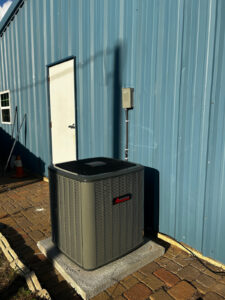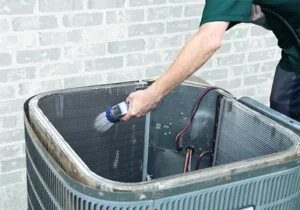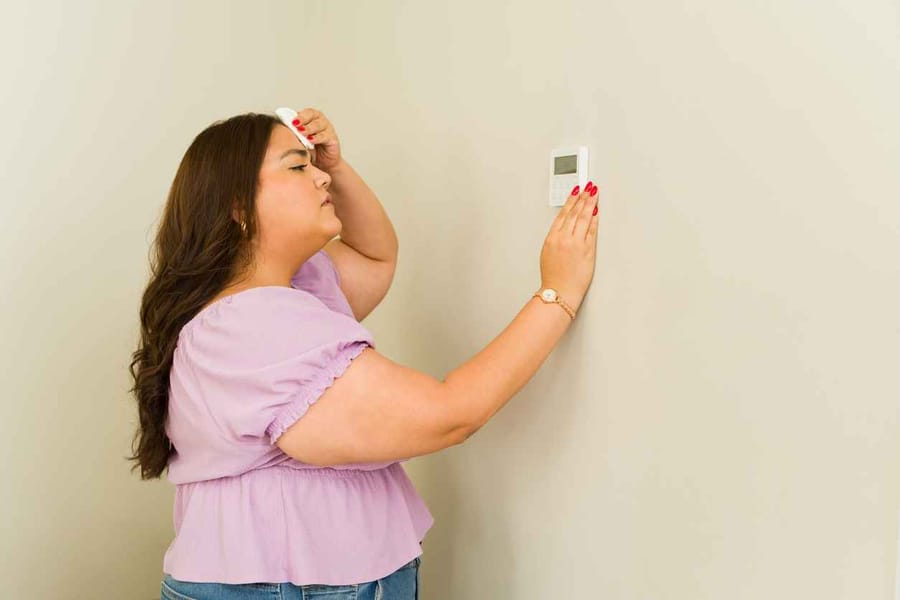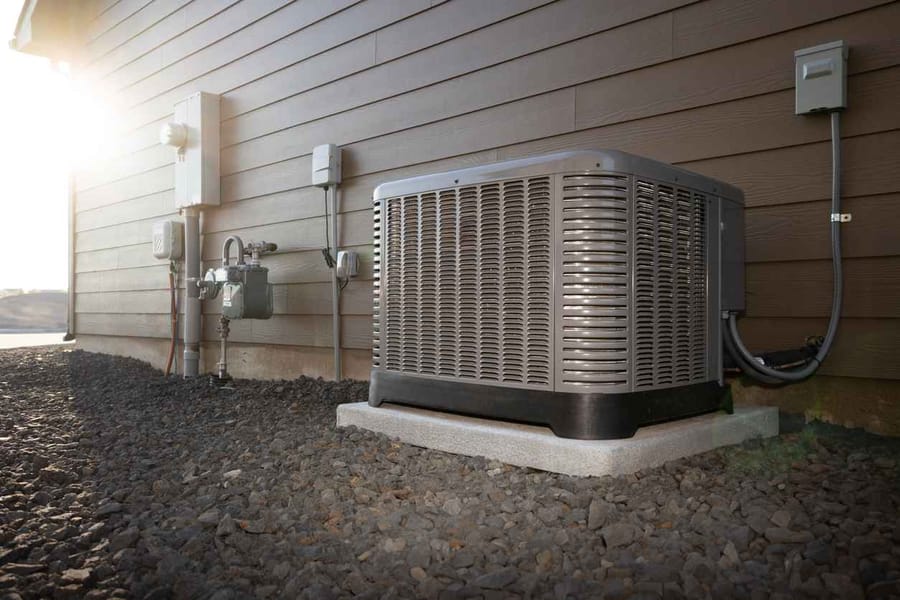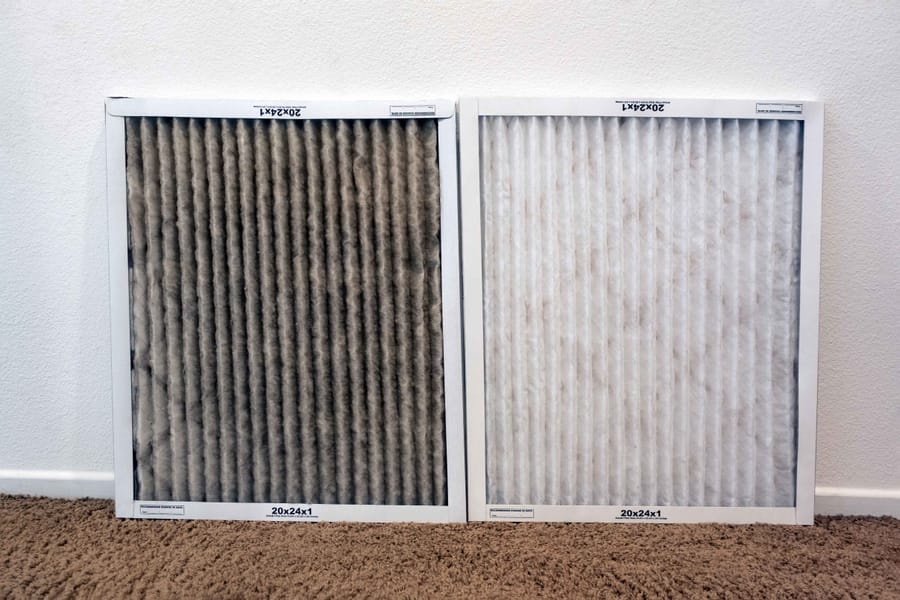4.6

What to Do When Your AC Smells Like Mildew
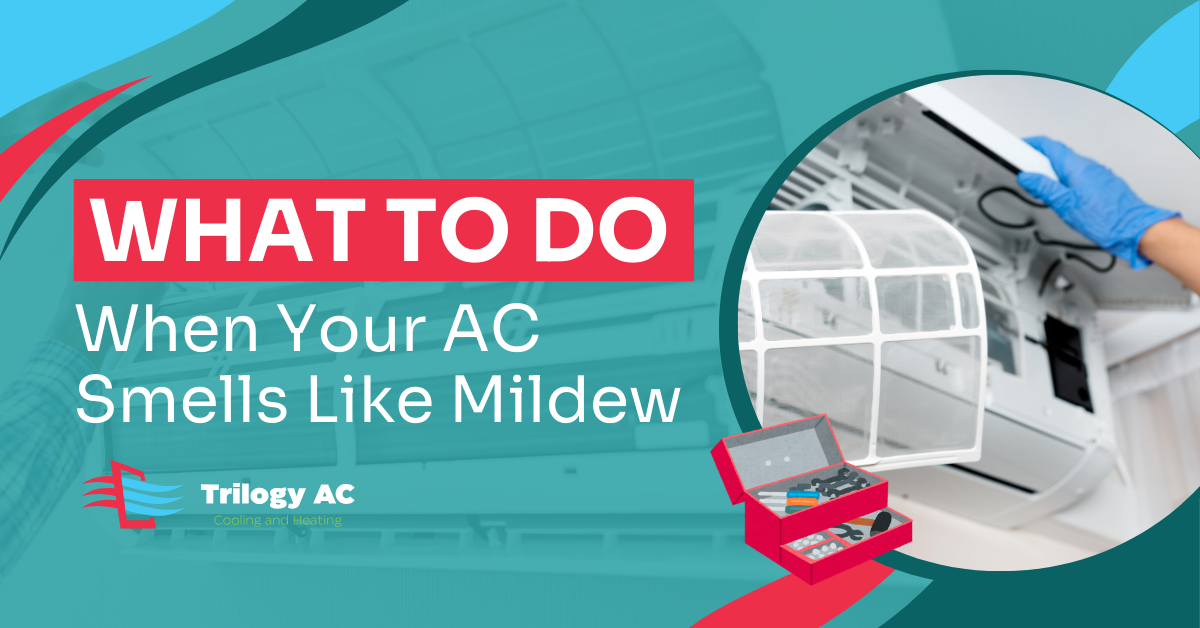
The Houston, Texas, area is known for its extremely hot summers and high humidity. With that high humidity comes a lot of moisture, which can cause various problems with your home’s HVAC system. If your AC smells like mildew, don’t fret. The experienced team at Trilogy AC Cooling and Heating has some tips for you regarding the best steps to handle mildew smells, why they occur, how mold affects indoor air quality, and more.
Common Causes of Mildew Smells in AC Systems
Several things can cause a mildew odor in your air conditioner. Here are some of the most common reasons why you might experience mildew smells in your AC system.
Drainage Issues
If the drain line from your AC system is clogged, condensation cannot escape, leading to water buildup in the drain pan or somewhere else within the system. A full drain pan also causes stagnant water, which creates a breeding ground for mold and mildew, creating that unpleasant odor you recognize. Moisture may also accumulate in your air ducts, resulting in stagnant water, which provides an ideal environment for mildew growth.
Problems with Airflow
Good airflow is the key to an efficient AC system and can also impact mildew growth. Dirty air filters force the AC to work harder, which may lead to excess moisture buildup on the coils. Anything blocking the airflow, including areas near the vents, will eventually lead to moisture building up, which could create a mildew issue.
Issues with the Evaporator Coil
Moisture condenses near the AC’s evaporator coil as your air conditioner runs. If this component gets dirty and clogged, it becomes a prime mold and mildew growth area. A frozen evaporator coil is one of the most common causes of unpleasant, musty, mildew-like odors. When this coil is frozen, it creates moisture buildup that leads to mildew and mold growth. It’s best to contact an experienced HVAC technician for an inspection or AC repair.
Identifying the Source of the Odor
There are several things you can check to help you identify the source of the unpleasant mildew odor coming from your AC system. Try these tips to help you locate and identify where the odor is coming from:
- Inspect your air filter: Look at your AC air filter and make sure that it looks clean and clog-free. If it’s dirty, replace it with a new one to see if that clears the air.
- Check the drain pan: Inspect your AC’s drain pan to make sure it’s not full of water. Also, look at the drain line to make sure it’s not clogged.
- Look at the evaporator coil: Locate your AC’s evaporator coil and verify that it is not frozen, dirty, or clogged.
- Inspect for leaks: Look carefully around your AC unit, vents, and ductwork for signs of leaks, such as dripping or standing water, which could cause mildew odors.
A thorough visual inspection of your air conditioner, ductwork, and crucial components can often help you identify the source of mildew smells. If you can’t remedy the problem, contact the pros at Trilogy AC for reliable, prompt assistance.
Steps to Eliminate Mildew Smells
The musty, stagnant smell of mildew is not pleasant. Take these steps to eliminate and remove mildew smells from your AC:
- Step one: Change your air filter if it looks dirty or clogged or has been in place past the recommended time frame (usually between 30 and 90 days).
- Step two: Thoroughly clean the evaporator coils to remove dust, dirt, and debris that could cause them to clog or freeze.
- Step three: Look for leaks in the drain pan, ductwork, and condensate lines, then clean these areas thoroughly to help prevent moisture buildup that may lead to mold.
- Step four: Contact a professional HVAC company to inspect, clean, and seal your ductwork to reduce moisture and provide cleaner air.
- Step five: Use special odor-absorbing products or sprinkle baking soda in your vents to help absorb the moisture and unpleasant smells.
- Step six: Implement routine AC maintenance for mildew prevention, including an annual inspection and cleaning performed by HVAC professionals.
Impact of Mildew Smell on Indoor Air Quality
The impact of mildew on indoor air quality is significant. Mildew is a type of fungus that affects your home’s smell and your body’s reaction to indoor air. As mildew grows, it disperses spores — particulate matter that spreads throughout your home if not addressed, causing symptoms such as headaches, coughing, skin irritation, dizziness, nausea, and worsening respiratory conditions, especially in individuals with asthma or allergies. Additionally, some molds produce microbial volatile organic compounds (MVOCs), which release strong, pungent odors.
When to Seek Professional Assistance
If you’ve followed the tips above to eliminate mildew smells but still have these issues, it’s time to seek professional assistance. Consider calling Trilogy AC for professional AC cleaning services.
You Can’t Find the Source
After you’ve checked your ductwork, vents, air filter, and AC components and cannot locate the source of the mildew smell, it’s time to call in the professionals. Experienced technicians know what to look for and have the tools and knowledge to inspect your AC system more thoroughly to find and remedy the issue.
The Odor Persists
If you’ve replaced the air filter and cleaned the drain pan, evaporator coils, and other components, but the mildew smell remains, it’s time to contact the experts. That unpleasant mildew smell could come from an area you simply can’t see on first inspection. Plus, HVAC professionals have several options to remove the odor, including installing special UV lights to help kill mold, mildew, and bacteria.
Contact Trilogy AC Today
Trilogy AC Cooling and Heating is available for professional HVAC inspection and maintenance services if you encounter issues with mildew smells in your AC system. We proudly serve customers in Katy, Cypress, Jersey City, Houston, TX, and the surrounding areas. To ensure efficient and healthy cooling in your home, contact us to schedule a consultation today.

Hire The Trilogy AC Professionals
Get top-notch service for your home today. We have the skills and expertise to handle your AC, heating, and air quality needs in a timely and professional manner.

